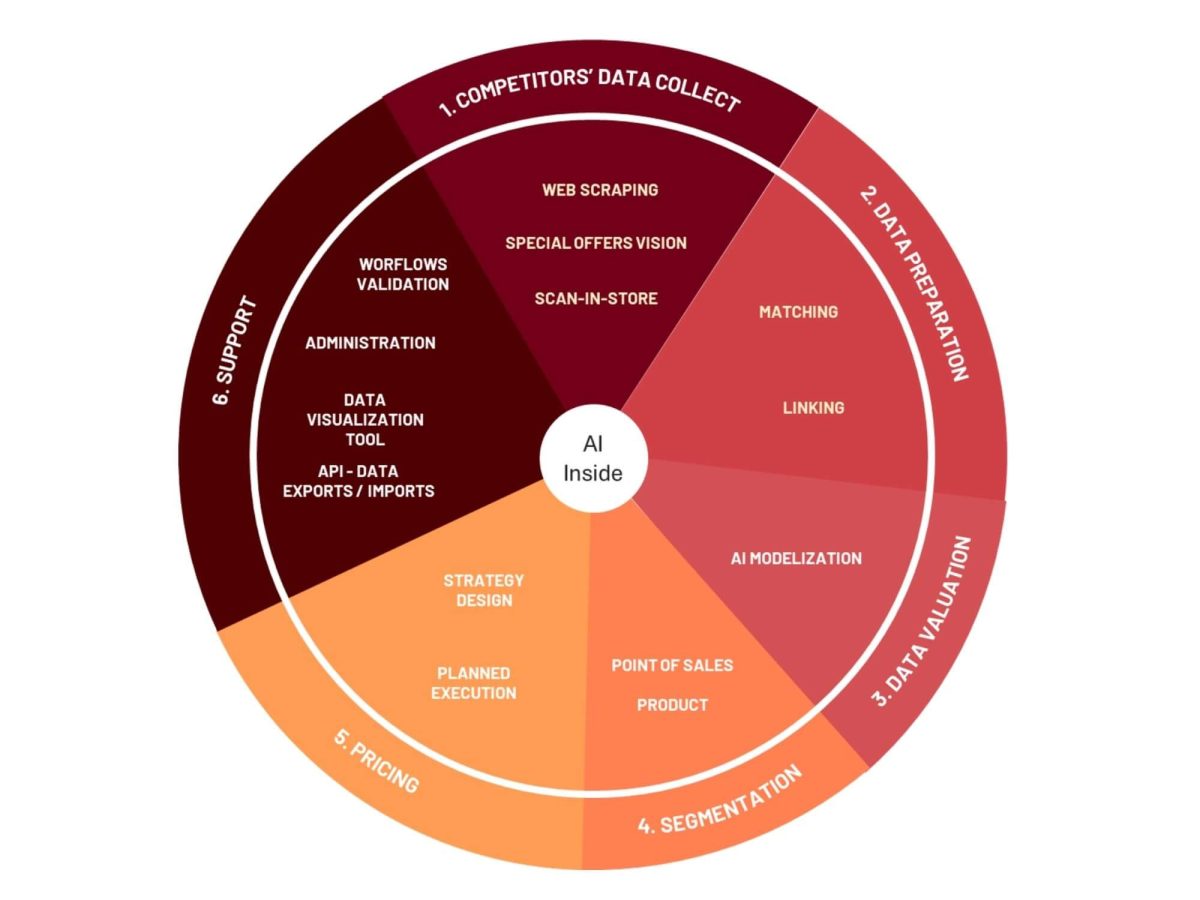OptimiX XPA - Pricing Analytics Complete pricing tool to maximize your margins.
Follow and analyze your competitors’ price trends online and/or in-store, benefit from our AI to accelerate your product matching.
Compare your price positioning to your competitors and optimize your pricing strategy , which can save you 3 to 5% in margin.
PRICING ANALYTICS
OptimiX Pricing Analytics
Optimize your margins and price positioning with a 360° solution and a proven methodology.
Positioning index Price
+ 2 points
on average
Image Price
100%
range consistency
Process industrialization
> 50%
time-saving for teams
Margin rate
> 3 points
on average
A pricing solution approved by over 75 customers in France and abroad.
XPA - The
retail pricing software that brings consistency to your product ranges
Price inconsistencies between ranges destabilize customers and weaken your price positioning. Gets added to this the difficulty of identifying the right moments to adjust your prices in response to variations in demand.
Optimix’s 360° retail pricing software lets you create unlimited pricing rules, harmonize your ranges and automatically trigger adjustments thanks to AI.
The result : a coherent strategy, up to -5% margins, greater clarity for your customers and faster decisions, driven by real-time market data.

Why is a pricing solution essential to your pricing strategy?
Reduce your operating costs by 20 to 30%.
Our pricing platform is designed to reduce manual tasks, streamline IT integration and simplify maintenance. Gain efficiency without complexity.
Reduce up to 30% matching errors
Thanks to a data-driven approach and AI algorithms, our pricing solution accurately aligns your prices, automates your pricing adjustments and helps you make strategic decisions based on reliable, real-time data.
- 25% to 40% reduction in analysis time
Reduce your analysis time with a data-driven pricing tool, intuitive dashboards and centralized KPIs. Visualize, measure and decide faster, with greater precision
+ 50% more productivity with an integrated, collaborative platform
Centralize your data, facilitate coordination between teams and implement unlimited pricing rules with tools designed for efficiency and performance.
Those extras that make all the difference!
Data-driven analysis
AI transforms your data into actionable decisions to boost your performance in real time.
A single, integrated platform
Fluid, seamless control thanks to interconnected modules and a unified interface.
A complete and unique ecosystem
All key functions from pricing to profitability in a single, coherent, centralized solution.
A team dedicated to your challenges
Data, pricing and business experts at your side to transform your data into growth drivers.
Integrated data visualization
Direct access to key data without third-party tools for smooth management and simplified adoption.
Guaranteed data security
Your data is encrypted, hosted and protected to the highest standards on the market.
Advanced pricing tool with dashboards to monitor and adjust your prices
Visualize your price, margin and inventory variances in real time. Accurate sales forecasts
Optimix’s pricing tool enables you to view all your pricing data in real time, and obtain accurate sales forecasts.
You gain clarity, detect optimization levers and adjust your prices according to market signals.
Customized dashboards give you an overview of your prices, margins, competitive position and sales forecasts.

A proven end-to-end methodology to transform your data into profitable decisions
At Optimix, our approach is based on a rigorous sequence of steps, entirely designed to meet the strategic challenges of pricing.
Data collection
Our teams collect data from your in-store and online competitors. This phase guarantees a comprehensive, up-to-date view of your business environment.
Modeling and processing
Our AI algorithms model demand elasticity, adjust prices according to market trends and optimize your pricing strategy to maximize your margins.
Recommendations
Thanks to our recommendation engine, your scenarios, price adjustments, intelligent allocations and stock coverage optimizations. Your teams make decisions based on facts, not intuition.
Cleaning and structuring
Raw data is purified, enriched and organized so that it can be used. This ensures consistency between your internal (ERP, POS) and external sources.
Visualize your scenarios
Results are displayed through dynamic, customizable dashboards, giving you a real-time view of your key indicators : margins, price differentials, service rates, stock levels, restocking alerts, etc.
Partners who testify to our expertise and commitment
“The tool perfectly meets our users’ expectations, thanks to total transparency in its operation and settings.
Its management by exception and “typical week” approach have enabled us to optimize our forecasting and procurement efficiently. What’s more, integration into a standard ensures the stability and ongoing evolution of the solution, while respecting project deadlines and costs.”
Eric Gilbert
Purchasing Manager, Buffalo Grill
“Optimix is a high-performance, feature-rich solution that has improved our daily lives. Implementation was very quick, smooth and efficient.
Price management is now more efficient. We are continuing to develop the solution with functionalities adapted to our needs.
It’s essential for us to be able to keep pace with business requirements. I’m very satisfied with the collaboration, both during the deployment and today.”
Katarzyna Pieńkowska-Pawlik
Pricing Manager at Auchan Poland
“My experience in using the Optimix solution and working with the teams has been very positive.
This software has significantly improved our pricing decisions thanks to accurate information. We have benefited from a strong relationship with the OptimiX Solutions teams, and the rapid deployment in 6 months has reinforced our confidence in this successful collaboration.”
Mathieu Louchez
Pricing and Assortment Leader at Boulanger
“Thanks to the optimiX Solutions’ solution, we have not only reduced the number of errors, but also maximized our analysis capabilities, in particular for segmenting our competitors (BtoB, BtoC, etc.).
Our business teams managed to halve their alignment time, with increased productivity: over 12,000 products linked in just 3 minutes.
The solution is complete and covers our needs 360°. The tool is ergonomic and price management is simplified.”
Jérémi Dusong
Pricing Project Manager at Bureau Vallée
Modules designed to cover your pricing needs from A to Z
All your pricing needs in a single tool
collect competitors' prices in-store
Collect in store competitor prices, carried out by our surveyors via a dedicated mobile application.
Match and chain your products
Linking of competing products (automatic based on EAN or compared using a proximity score).
Structure your ranges
with product linking
Link and structure your product ranges to improve readability, strengthen your price image and facilitate decision-making.
Create your pricing strategies
Design, configuration, and implementation of your pricing strategy. Creation of price alignment rules.
Why choose us?
Robustness, ease of use and adaptability are the pillars on which our solutions have been developed.
Reliable, high-performance, secure software
15 years of experience
Intuitive, 100% customizable interface
Strong expertise in Distribution
360° coverage of pricing issues
Expert, senior consultants
Single point of contact
100% in-house expertise

THESE PLUS
THAT MAKE THE DIFFERENCE
An advanced Data-Driven approach with AI to optimize your prices and inventory, by analyzing data in real time.
Visualize your pricing KPIs: price positioning, margins, elasticity, competitive gaps and strategy performance.
Business expertise integrated into the heart of the solution, and a flexible, customizable and actionable rules engine.
Do you have any questions?
Who is Optimix Pricing Analytics for?
XPA is aimed at retailers and distributors in all sectors who want to optimize their margins, harmonize their prices and react more quickly to market fluctuations.
What benefits can I expect from XPA?
You can expect up to +5% operating margin and a 30% reduction in matching errors and a productivity gains of up to 50 thanks to an integrated, intuitive and collaborative platform.
How does the product matching engine work?
Our AI algorithm automatically compares your products with those of your competitors (online or in-store), even without a direct reference match. This gives you a reliable basis for comparison, enabling you to steer your pricing decisions.
Can I track my indicators in real time?
Yes. Our dynamic dashboards allow you to visualize your pricing KPIs in real time, detect critical deviations and adjust your strategy in response to market signals.
Is the solution compatible with my information system?
XPA is interoperable with the majority of ERP, PIM and business tools on the market. Integration is rapid and can enable up to 30% reduction in IT costs, integration and maintenance costs.
Can I automate my pricing strategies?
Yes, you can define unlimited pricing rules and automate adjustments based on your margin targets, competitive data or changes in demand.
Is the platform difficult to learn?
No. The interface has been designed to be ergonomic and intuitive with a strong collaborative component. You will benefit from complete support throughout deployment.
Can I simulate the impact of a price adjustment?
Absolutely. Thanks to our simulation engine, you can anticipate the impact of your pricing decisions on sales, margins and positioning before going into production.
What types of data are used?
XPA leverages your internal data (sales, costs, inventory, history) as well as external external competitive data. The whole is treated in a data-driven to generate precise, relevant recommendations.
How does customer support work?
We start with a personalized framing phase to analyze your needs, challenges and business environment. Then our team of experts to support you at every stage of the project : configuration, training, responsive support and regular performance workshops to guarantee continuous adoption and value enhancement.
